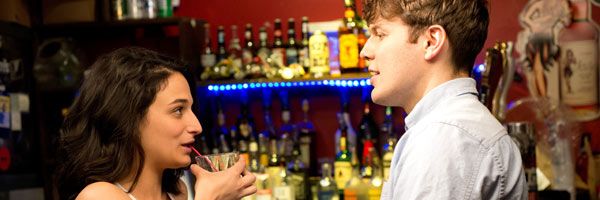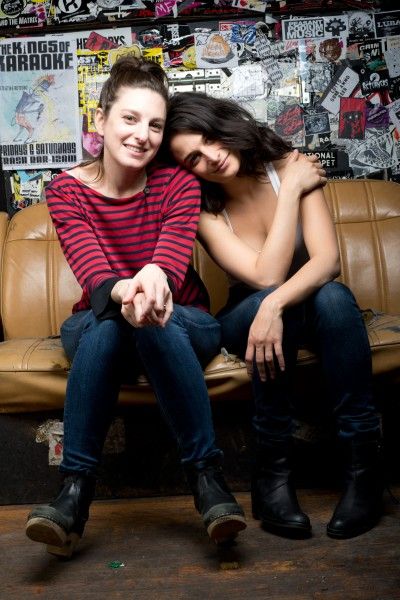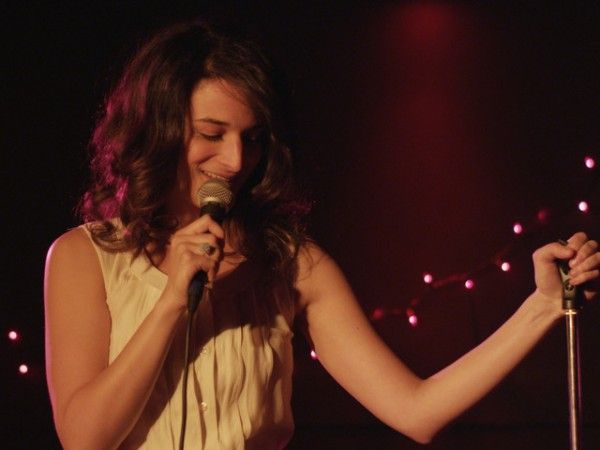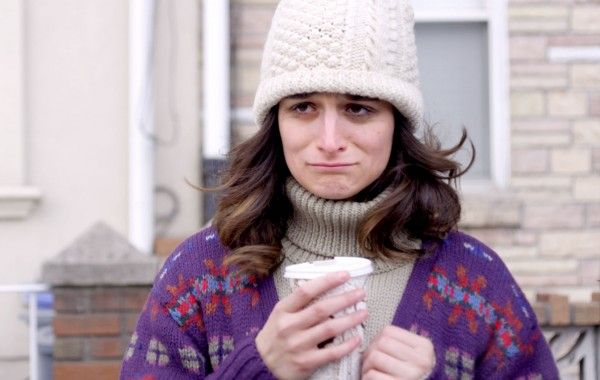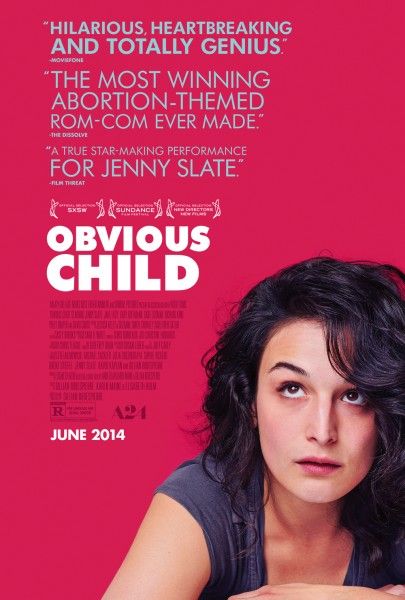Writer/director Gillian Robespierre’s feature debut, Obvious Child, is outrageously funny as well as heartfelt, and it’s anchored by a terrific performance from comedian Jenny Slate who brings heart, hysterical humor, honesty and vulnerability to the role. Slate’s character, an aspiring stand-up comic who gets dumped, fired and pregnant just in time for Valentine’s Day, is relatable, authentic and sure to resonate with audiences. Now playing in limited release, the romantic comedy expanded from Robespierre’s 2009 short also stars Jake Lacy, Gaby Hoffmann, Gabe Liedman, David Cross, Richard Kind and Polly Draper.
In an exclusive interview, Robespierre spoke about the evolution of the short into the feature, the expansion of the plot and characters, what Slate brought to the project, what it was like directing her first feature, what distinguishes the film from other rom coms, her fun friends and family screening, and what she learned about herself in the process of making the movie. She also discussed her upcoming film set in New York City, currently called Untitled Divorce Project, that centers around the lives of three women and features a role written for Slate. Hit the jump to read the interview.
Collider: Can you talk about how this project first came together for you?
GILLIAN ROBESPIERRE: It started as a short film that I made with my friends, Anna Bean and Karen Maine, and it starred Jenny. It was this story we really wanted to tell, and we shot it in four days with very little money, nothing as extravagant as what we had on the feature. We shot for no money. I knew we had something magical in the editing room, and I wanted to go back out immediately and finish shooting this story. I felt like there were so many things we could have expanded on, but it was a short. We only had 20 minutes, and I’m glad we didn’t, because we decided to edit it and let it out into the world as a short. I’m proud of myself for not being compulsive about it, because we had to grow as storytellers, and the story really wasn’t there 4-1/2 years ago. The story was there, but not the story we see today, so I’m glad we waited. When we did finally release the short, it was exciting because people were talking about it. People were watching 20 minutes of our movie. On Vimeo, you can tell how many people complete the screening, so statistically it was pretty cool. I mean, a lot of people did stop 10 minutes in, but a lot of people finished it. A lot of people sent me private messages and wrote on our Vimeo wall.
How did the short evolve into the film we’re seeing now? How much changed from the original script?
ROBESPIERRE: A lot has changed. The heart and the sort of thesis is the same, but so much has changed. I started collaborating with this person named Elisabeth Holm. We met at a filmmaker mixer, and we got along like bandits, and she came on as a producer, but a real creative producer. We collaborated on the story together to the point where it changed dramatically. Donna’s world was a lot smaller in the short. Her parents didn’t really exist. Her mom existed, but as a phone call. It was played by my own mom. Polly Draper (who plays the mother in the feature) is not my mom. Polly Draper is a beautiful, wonderful actress. We tried to change the relationship in the romantic part of the movie where we expanded on this Max character that’s played by Jake Lacy. That was the most playful, fun part of writing this movie, which was throwing them into typical romantic comedy scenarios where you do the bump-ins and the random meet-ups, and using those parameters and boundaries, but fucking them up a little bit where they actually curse when they bump into each other. It was creating conflict in their romance. There was never going to be conflict in her choice to have the abortion. That was done swiftly and early on in the film. The conflict we came up with in the expansion was just the romantic conflict and the conflict that she has within herself about who she can trust. She’s not really trustful of herself. She doesn’t really trust the Max character.
What did Jenny bring to the project?
ROBESPIERRE: So much. The role was written for Jenny. We were really adamant on the tone. We were on the same page with who Donna was. I trust her performance so much. I trust her as an actress and also as a stand-up comedian. It was a true collaboration. The material on stage that she’s doing in the comedy acts is a real collaboration. She is bringing so much of her own sensibilities of stand-up, and taking the bullet points and what I had written on the page, but expanding on it and finding really beautiful moments, both comical and also heartfelt. That was a great marriage. Also, the little inflections that Donna has, that’s Jenny. That’s her being intuitive to what this character is, who she is. She’s free of sarcasm and a totally honest person all the time, and that’s something that was born from Jenny.
It’s a brave film and you take lots of risks. What was it like helming your first feature film?
ROBESPIERRE: It was incredible. The short had five people on it. Here I’m sitting around, interviewing people to collaborate with, and finally settling on a crew of 30 and a cast. It’s not a big cast, but a crew of 30 at first was a little daunting. To be an employer of 30 people was exciting. You don’t get paid a lot on independent films. I mean, I made $3 million. (Laughs) Now that’s sarcasm right there. It was nice to know that people were there and attentive and focused for those 18 days that we were shooting. They loved the script and they loved working with Jenny. We were all very focused and in this tunnel vision Obvious Child world that worked out perfectly. It was a fun set. It was an open set. Everyone was sweet to each other and focused. There was no competition. It was quick, but we knew what we wanted, and because of the 4-1/2 years it took, we trimmed all the fat that could have been trimmed from the script. We knew this compact story we wanted to tell and there was not that much on the cutting room floor.
This is an outrageous comedy with a lot of heartfelt humor. What do you think distinguishes your film from the usual rom coms?
ROBESPIERRE: I don’t know what sets it apart. I just know that we were seeking something with our characters, and that was authenticity, honesty and vulnerability. We wanted to let our main character and her life and friends be vulnerable and not be perfect. In a lot of romantic comedies, it’s all about perfection, getting the guy, getting the right job, and getting the right montage makeover sequence. (Laughs) I enjoy those sequences, but for us it was just about a subtle way of showing what life and growth and change look like.
Did you have a friends and family screening?
ROBESPIERRE: Yes! It was cool. We cut on nights and weekends all summer because I had a day job. We had three test screenings in a tiny little theater in my friend’s condominium in Williamsburg. Some friends were invited, and my family, and some people who I didn’t know that my producer Elisabeth knew, which was great. We got great feedback from them. We had a questionnaire, and I think we were as legit as a studio would be, but our questions were not like, “Do you want to fuck this character?” They were like, “Did you find her to be empathetic? Was there anything that seemed false? How do you feel about the abortion?” We were very open with the people who were there to tell us and be as hard on us as possible. It was really helpful. And then, we did a friends and family screening finally in June, a couple days before our premiere in L.A., and my heart was racing because it was like all of my family was there – my brother, my parents, my co-workers who I had just left after seven years. I had a lump in my throat. It was fabulous. People were so nice afterwards. I was really happy.
What did you learn about yourself in the process of making this?
ROBESPIERRE: I think it was being comfortable in being uncomfortable, if that makes any sense. Comfortable in that I feel like for me everything is a learning process, and when I am sure of something, I am going to say it. I’m not nervous about how I come across because I trust myself, and no one’s told me I’m an asshole yet. I’m kind about it and sweet about it, but I’ve really learned how to be open to the mistakes that happen every day. It was a triumph and a failure, and every day was hard, but then it’s all worth it, because this is all I wanted to do my whole life. So, when we were sitting in the editing room and I would see those moments, I just learned. Hopefully, I’ll keep on learning.
What are you working on next that you’re excited for audiences to see?
ROBESPIERRE: My producer, Elisabeth Holm, and I are going to make a movie. Right now it’s called Untitled Divorce Comedy. We’re writing a role for Jenny and it takes place in New York. It’s going to follow three women who are afflicted by divorce. It’s one family though. We’re in the process of writing and developing it. There are a lot of other ideas, but that’s the only one we want to talk about because we’ve already sold it and it’s been written about in Variety.

